Background<Why are girls dropping out of school because of menstruation?>In countries like Uganda, children face numerous barriers to continuing their education—poverty, long distances to school, and more. Yet one critical and often overlooked factor is menstruation. For many girls, their period becomes a reason to miss school or drop out entirely. Cultural taboos surrounding menstruation mean that adolescents rarely receive accurate information at school or home. As a result, menstrual health, hygiene, and sexuality education are severely lacking—leaving girls unprepared and unsupported. In 2015, before GBN was formally established as an NPO, we launched the project “Reusable Sanitary Pads for School Girls” to help girls who were missing school because of their period. We had learned that many girls couldn’t afford sanitary pads and were forced to use unhygienic alternatives like old clothes, which posed serious risks of infection and discomfort. Some girls experienced leaks during class and were laughed at by male classmates, leading to shame, absenteeism, and even dropping out. To address this, we distributed reusable cloth pads that could be washed and reused for a year, and conducted a survey to assess their impact on girls’ school attendance and wellbeing. The results were striking: girls’ attendance and academic performance improved significantly, and even cases of girls returning to school after dropping out were observed. Missing up to a week each month due to menstruation can add up to nearly three weeks per term—deeply affecting grades and attendance. This often leads to dropout, causing girls to miss out on opportunities to pursue stable, well-paying jobs. The study also revealed that lack of menstrual knowledge, hygiene education, and low gender awareness among both boys and girls were major contributing factors. |
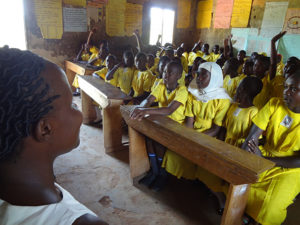
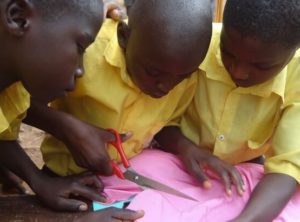
<A Society Where No Girl Gives Up Education Because of Her Period>
Building on these findings, GBN has expanded its support to include reusable sanitary pad-making workshops, menstrual health education, hygiene and sexuality training, and gender awareness campaigns. However, challenges remain—such as insufficient teacher training and inadequate facilities like girls’ toilets, washrooms, and changing areas. GBN is committed to addressing these gaps and improving school environments to boost girls’ enrollment and retention in Uganda.
Many women who cannot afford disposable pads are unaware that reusable reuseable sanitary pads even exist. When girls from low-income families drop out, they face increased risks of child labor, early marriage, pregnancy, and involvement in the sex industry. To ensure girls can lead independent, empowered lives, it is essential to create school environments where they feel safe and supported—even during menstruation. Through menstrual hygiene management (MHM) initiatives, GBN is working to expand girls’ access to education and protect their futures.
【Current Activity】
"Support the introduction of School Menstruation Hygiene Management (MHM) under local government for a Girl-Friendly Educational Environment”
(2025~)
<Local governments take the lead in tackling menstrual health challenges in schools.>
Under this JICA Grassroots Technical Cooperation initiative, the Nansana Municipal Government is spearheading efforts to establish and institutionalize MHM systems in schools. By engaging educators, parents, community members, and government officials, the project aims to reduce dropout and absenteeism among girls. Key activities include setting up changing rooms, Teacher training on menstrual health support, reuseable sanitary pad-making workshops. establishing MHM clubs, organizing PTA meetings. The local government leads these efforts, ensuring sustainability and community ownership.
【Past Activities】
"Project for improving schools’ educational environment for adolescent girls by addressing menstrual hygiene challenges
in Uganda”
(2021~2024)
<Expanded into a JICA Grassroots Technical Cooperation Project>
From 2021 to 2024, GBN carried out support activities in Uganda’s Mubende, Butambala, and Wakiso districts to create a safe and supportive school environment where girls could attend school during their menstrual periods and complete basic education. The activities included teacher training to strengthen response capacity, reusable sanitary pad making within schools, hygiene and sexuality education, gender equality awareness sessions, and facility improvements (toilets, washrooms, changing rooms). Support was also provided for the operation of MHM (Menstrual Hygiene Management) clubs. In addition, GBN adopted a comprehensive approach to sustainability by conducting community outreach to deepen understanding of girls’ education and menstruation, establishing promotion centers responsible for the production, sales, and training of reusable sanitary pads, and strengthening collaboration with local governments.
November: School to school MHM club learning visits and Project school monitoring visits
October: Conducting radio talk shows and monitoring project schools
September: Project schools monitoring visits and conducting MHM at the TiCAD cup 2023
August: Conducting radio talk shows and project monitoring with the GBN team
July: Conducting radio talk shows and the Fifth MHM Online discussion
June: School monitoring visits and preparation for Fifth MHM Online discussion
April: School to School visits, School monitoring visits and 3rd MHM Online discussion
◆ School to School Visit in Butambala (November 2023)
◆ School to School Visit in Mubende and Wakiso (November 2023)
◆ Target school monitoring report (November 2023)
◆ Target school monitoring report (October 2023)
◆ Target school monitoring report (September 2023)
March: Midterm review meeting and School to School visits
February: Pad making training and delivery of startup materials, Distribution of edited version of booklets and Monitoring
January: Preparing new opening promotion Center in Butambala and Online Training
December: Happy pad promotion Centre in Butambala and Distribution of face masks
November: Delivery of sewing machines and community awareness
October: Delivery of Sewing machines and pad making training
September: Procured sewing machines, purchased MHM T-Shirts, and activity in Happy pad centre
August: GBN school monitoring and visit to Ministry of Health and Education and Sports in Kampala
July: Awareness meetings to communities, establishment of MHM clubs and Inspection of school washroom facilities
June: Teachers’ trainings, awareness meetings, and establishment of MHM clubs
May: Online demonstration about MHM and sanitary pad making
April: Editing the booklet, Rennovation of happy pad promotion centre
◆Community Awareness Report
◆Teachers’ Training Report
◆ Reusable Pad Making Training report
March: Rennovation of WASH facilities
February: Project inception meetings, Drafting a booklet and a brochure
January: Promotion Center, Radio Talk Show, and Schools Facilities’ Task Check
December: Data collection Exercise from the three Districts for Baseline Survey
November: Project introduction to Districts and Baseline Survey
◆Baseline Survey Report ( Abstract ) *Please contact us if you would like to see the full report.
Video of Monitoring Visit in Uganda (July-August, 2023)
◆Mubende District (July 31 – August 2, 2023)
Field visits 3 schools out of 10 target schools (Partner organization: SORAK)
◆ Wakiso District (August 4, 2023)
Field visits 2 schools out of 10 target schools and Nansana Municipal Council (Partner organization: SORAK)
◆Butambara District (August 8, 2023)
Field visits 2 schools out of 10 target schools and Butambala district headquarters office
(Partner organization: VOTU)
'Improvement of School environment to combat Menstrual Hygiene Managment(MHM) to stop Adolescent Girl school Dropouts in Uganda'
(2017~2019)
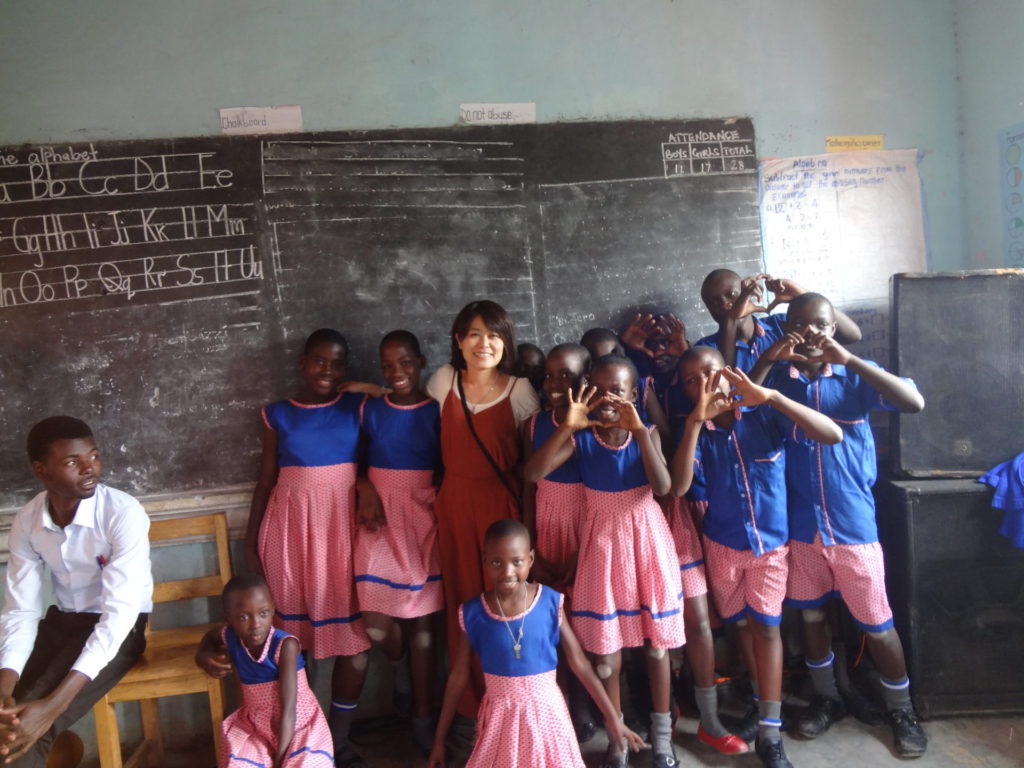
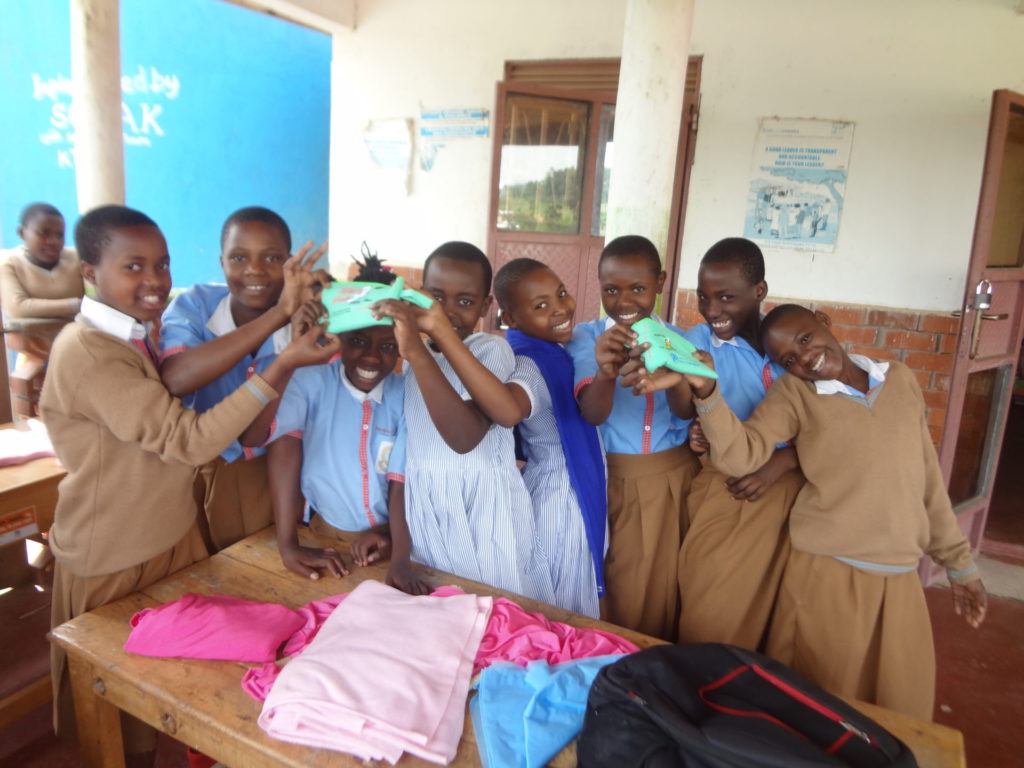

GBN conducted the three year project from 2017 to 2019 with the support of Lush Japan in collaboration with SORAK Development Agency,*, a local NGO in Mubende. SORAK provided instruction for making reusable sanitary pads, hygiene / sex education and gender awareness activities to prevent female students from dropping out due to menstruation. |
Activity1: Training community volunteers for Happy pads supply
Activity2: Community based of pad making with HOPE FOR FUTURE
Activity3: Training of Making Reusable Pads in Pallisa
Activity4: Session of Gender awareness and Sexuality Education in Pallisa
Activity5: Training of secondary teachers and students on MHM and Sex education
Activity6: Awareness raising via radio and video shooting reusble pad making
◆GBN’ director Maiko Ohnishi’s field visiting in Uganda in 2019
◆Impact assessmet of MHM in 2019
Activity 2-1:Facilitate MHM trainees to form 3 MHM peer clubs
Activity 2-2-1: Facilitating gender awareness session by MHM peer club
Activity 2-2-2: Facilitating Menstruation Hygiene Management (MHM) session by MHM peer club
Activity 2-2-3: Facilitating Sex Educationsession by MHM peer club
Activity 3-1 Kick start sanitary pad production and supply chain
Activity 3-2: Conduct 13 parish community meetings based on providing reusable sanitarypad information and awareness raising
Activity3-3&3-4: Conduct interactive radiotalk shows& air spot messages
◆Impact Assessment Report FY2018
◆Ashinaga & SORAK activity report
Activity1: Baseline line Report on Menstrual Hygiene Management among primary school girls in Kibalinga and Nabingoola sub-counties,Mubende District
Activity2: Training of Reusable Sanitary Pad Making & Menstrual Hygiene Management report
Activity3: Parents sensitization on gender Menstrual Hygiene Management
Activity4: Monitoring Report on Pad Making & MHM Training 2017
Activity5: Gender Awareness session
Activity6: Menstrual Hygiene Management & Sex Education 2017
Activity7: Menstrual Hygiene Management Impact Assessment Report _2017
◆Field Trip to monitor the project in Uganda
How this project was initiated (2015)
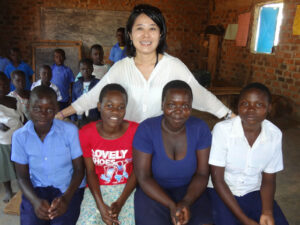
Through the crowdfunding called ‘Readyfor’, the project “Reusable Sanitary Pads for School Girls” had been implemented.